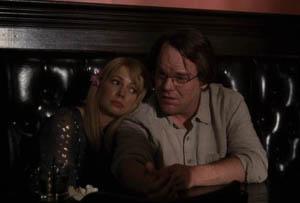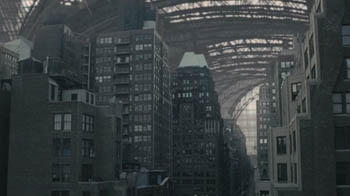|
"Synecdoche" is a literary device (epitomized by such turns of phrase as "sea of faces") by which a portion of something is used to represent the whole, or vice versa. This understood, one could marvel that with this film, there has finally been created a punning title that has a point other than merely being clever; indeed, the cleverness is almost totally undercut by the fact that virtually nobody in this borderline illiterate country knows what the word "synecdoche" means. 
This is screenwriter Charlie Kaufman's directorial debut. The plot centers on a despirited New York playwright's attempt to create something new and meaningful. The recipient of both a MacArthur "genius" grant and faint praise from his wife, who laments that he merely rehashes old standards with a slight new spin (casting the leads of Death of a Salesman with young people, for example), Caden Cotard begins to forge a new, experimental theater that will bring a heretofore unrealized reality to the world of performance. With no script, he encourages his troupe to become their characters, to live them and explore them, gradually creating, over the course of years during which his actors lament the continued absence of any audience, a microcosm of the world as he sees it. His "art imitates life" approach extends ever farther, until the process of creating the play is itself folded into the play, with actors portraying himself and his staff. If that sounds familiar, it might be because you've already seen Kaufman's earlier, Spike Jonze-directed film Adaptation, a film about nothing less than its own creation. One might conclude that Kaufman is something of a one-trick pony, and could well be correct in so concluding. That's not a condemnation; most ponies we meet can't do any tricks at all, and if the one trick they know is largely left undone by others, it's still a worthy thing to see, or can be, providing the pony isn't in a debilitating bout of depression when it starts bowling, or whatever this clever pony does. It's possible, however rare, to respect a film's craft and artistry without particularly liking it. Whatever it is that Caden is attempting at any given point, be it connecting with his family, understanding just what he wants his play to do, or simply getting laid, he's awkward and bad at it, and ends up sad and lonely. Frankly, there's only so much "sad and lonely" I feel the need to voluntarily immerse myself within. Structurally, the film is like a picture of a man with a magnifying glass examining the same picture of a man with a magnifying glass, all the way down. It goes farther and deeper than most films venture to go, but the problem is that no matter how far down the scale one goes, the picture is always the same. This isn't absolutely, literally, true; one of the points to which the story returns is the matter of an actor's individual interpretation, and imperfection at portraying another real individual. But the outcome for poor Caden is still like sticking him between two parallel mirrors: he goes on and on, further and further, but without changing. It might be a telling experiment, albiet a rather cruel one, to hand out razor blades to moviegoers along with their tickets, just to see if there was any appreciable depreciation in the number of them who exited the screenings. 
This is the sort of film I like, but not the sort of subject. For all of its relentless demands, voiced by its main character, for total honesty, the film is not itself honest. It offers only one perspective. It plays with the notion of role-playing, the fluid and not-so-fluid nature of identity, the desire to create and to understand, but does so all in the service of dissecting one emotional vector. How many funeral scenes does a single film need? Not this many, frankly. Early on in the film, there's a scene wherein one of Caden's many romantic interests is contemplating purchasing a house which appears perpetually on fire. I wasn't sure if I was supposed to laugh at it or not. It felt transplanted from a much more whimsical film, and continued to stand out via its noticeable violation of convention-the film otherwise presents its story through events that would not happen, as opposed to ones that could not happen. If I could have just gone ahead and laughed, I'd have been happier for it. Without it, we have two hours of loneliness, despair, disenchantment, failure...thanks, we get it already. "This is everyone's experience," the film disingenuously tells us. I know of no one who spends every waking hour bemoaning the emptiness of it all. Yes, life is depressing. It's lots of other things, too. Why don't they get a seat at this multi-dimensional table? Why is only "brutal" truth counted as truth? What happened to the at least tacit hopefulness of Eternal Sunshine of the Spotless Mind? One might recall a scene in Adaptation where Nicholas Cage, playing Charlie Kaufman himself, asks the teacher of a screenwriter's workshop why a film cannot emulate "real" life by featuring no major events and leaving the characters unchanged, and is angrily told that such a viewpoint is narrow and dishonest, as well as a waste of the audience's time. In retrospect, one must conclude that Kaufman was playing devil's advocate, and not truly critiquing such an approach, which is why this film is intellectually stimulating but deeply unsatisfyingly emotionally. If people truly write what they know, it's starting to look like Charlie Kaufman knows only himself. -review by Matt Murray
|
|
||||||||